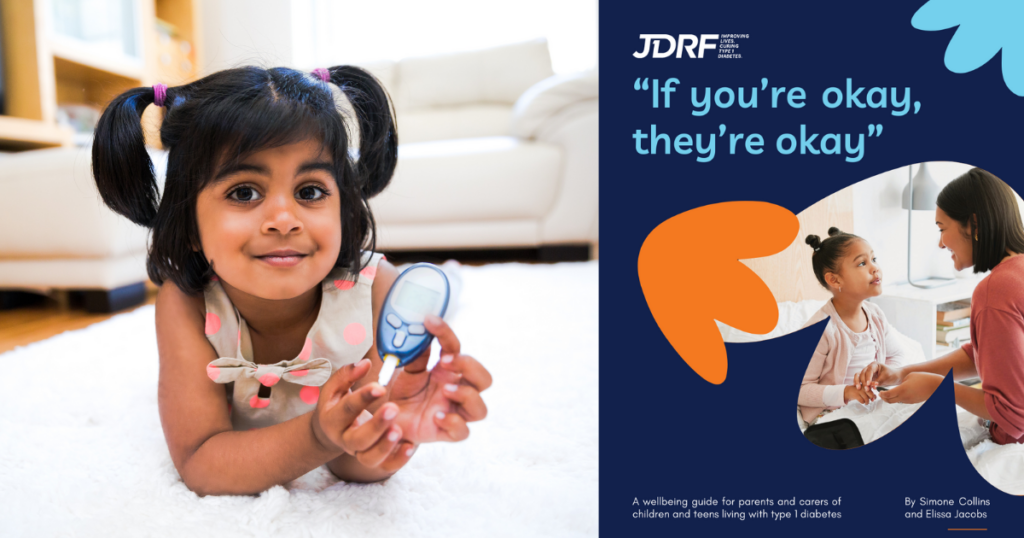Parenting a child who lives with T1D: what to expect at different ages

This article is adapted from ‘If You’re Okay, They’re Okay’, JDRF’s guide for parents raising children and teenagers living with type 1 diabetes (T1D). The book was written by Simone Collins, a senior diabetes social worker, and Elissa Jacobs, a clinical psychologist. Get your free copy here.
When it comes to T1D management, what can you actually expect your child to be able to do at different ages?
There can be a tendency to think that T1D accelerates development. We often ask our children to develop behaviours they may simply not have the ability to do. But it’s important to consider what you want or need your child to be doing versus what they’re actually capable of.
This section of ‘If You’re Okay, They’re Okay’ gives you an overview of different developmental stages, providing some understanding of how they interact with T1D, and to help you manage your own expectations. It will give you context around normal development that would happen with or without diabetes.
But first, no matter what age your child is, here are a few things to keep in mind:
- Remember that a diagnosis of T1D doesn’t accelerate development in any way. Your child is still your child, and they’re entitled to the carefree aspects that childhood brings.
- Try not to jump to T1D being the cause for all behaviours, as sometimes it is just normal development. But don’t dismiss it either. A tantrum can be ‘just a tantrum’ or it can be a child whose blood sugar levels are high, and they can’t explain how they’re feeling so they lash out instead. Try to rule out T1D first, and then address their behaviours.
- It’s important to understand that you can’t completely remove your child’s distress surrounding their T1D diagnosis and the associated tasks. It’s enough that you’re providing validation and support.
Please note: in this article, we’re describing typical development to highlight the broad challenges during these stages. We’d like to acknowledge that many children have additional needs – they may be neurologically diverse, have additional chronic illnesses to manage, or live with a physical or mental disability. This will add greater complexity.
Scroll down to your child’s age group:

You’ll see the largest changes in the growth and development of your child in their earliest years. (Think of the difference between the baby you bring home and the child you send to school!).
- With an increase in motor skills (fine and gross), your child’s activity will become far more varied and difficult to predict.
- While there’s rapid growth in the brain within areas of language, memory and learning, your child still lacks the cognitive ability to identify and alert you to their physical needs.
- As your child becomes a toddler, this rapid growth will slow down. Their appetite will reduce as a result, and they’ll be more likely to display picky eating behaviours.
- When they start to develop more reasoning skills you’ll be more likely to see resistance, as your child is more able to express their wants (including the discovery of the word “no”!).
- They’ll develop more of an ability to share and take turns, having more of an awareness of others.
What happens when we add T1D into the mix? Parents of children diagnosed in this age group have to use a unique set of parenting skills – which seems to include mind reading, as your child will lack the thinking and language skills to identify when their blood sugar levels are either too high or too low. Parents will also have sole responsibility of T1D management tasks, as their child won’t have the maturity or skills to take them on.
The lack of thinking and language skills also means kids this age struggle to communicate their emotional state. Their uncertainty, fear and distress will come across in their behaviour, and this can look like tantrums, aggression and refusal to comply with tasks.
To add more difficulty, it can be very tricky to tell the difference between developmentally appropriate behaviour (such as temper tantrums) and behavioural cues that signal high or low blood sugar levels.
You may feel like you’re intuitively managing their T1D in this developmental period, because you’re constantly looking for clues. You’ll also be challenged by rapid growth and changes in your child, and what this means in terms of their insulin needs.
This period of development makes T1D management unpredictable and far more challenging than one would expect. Please remember that when you’re being hard on yourself.
How to manage this developmental period
Parents must access every skill in their toolkit.
- Be consistent with clear expectations. Set boundaries and limits.
- Explain things in a way your child will understand. If it sounds completely rational and logical to you, as an adult, you’ve probably over-explained!
- Help your child develop emotional awareness and language to support them to express their emotions appropriately. For example, try reading books specifically designed to talk about emotions.
- Validate and help your child manage their own emotions.
- Manage your own anger and distress at your child’s behaviour.
- There will be T1D non-negotiable tasks, and you’ll need to be consistent in carrying these out. But watch your own expectations – just because you’ve explained why non-negotiable tasks exist (which is important for your child), it doesn’t mean that they’ll be accepting of them, or that they’ll be able to manage the frustrations associated with them.
- Your child might want to feel in control or be involved and helpful — and you can make this happen. For example, your toddler might want to choose what to wear for the day, so you can help by giving them the option of two or three outfits, and then they can pick. You might do something similar with some T1D non-negotiable tasks: try to find ways in which they can take part or make choices that work for both of you, such as letting them choose which finger to prick, or give them options for where to put their sensor.
Children grow at a more stable rate during this stage of development, with less of the dramatic variations in younger and older age groups.
- Their fine and gross motor skills will continue to develop, reaching a stage of mastery towards the end of this period.
- Their thinking and language skills will continue to improve, and they’ll be better able to articulate their needs
and wants. - Children will start to be more independent in this stage (but keep their temperament and environment in mind, too).
- Kids in this age group will compare themselves to their peers, and will be more conscious of rules and expectations.
While this can feel like a calm period of development, there are still things that need to be taken into consideration from a T1D perspective.
At this stage, children can start to verbalise their distress about T1D, as well as their worries about being different from other kids. This can be pretty challenging as a parent, as you’ll be trying to normalise T1D for your child in a way they’ll understand, while also trying to reduce their distress and improve compliance… all while managing your own distress as your child struggles with being different from their friends. It can be tough!
Your child’s ability to understand their diabetes and communicate their needs means they can have a bit more autonomy. They might start to be more involved in their T1D care as they show a bit more interest. But while they may have the fine motor skills to do a finger prick, they’ll still need your help and supervision to interpret any data. Children still have quite concrete thinking at this stage – they’re typically not great at solving problems yet, so you’ll need to stay highly involved in supervising and participating in T1D care.
How to manage this developmental period
- All children are entitled to experience childhood, so we need to be very careful that we’re not expecting them to be more responsible than they have the capacity to be because of our own fears or concerns.
- It’s important that we, as parents, manage our own expectations. We can come across as hypercritical and judgemental because we’ve already mastered these tasks and skills, and often forget that our kids are still in their learning phase. (For example, think about how long it can take your six-year-old to do up a button or tie their laces!) Resist the urge to take over when they want to do tasks themselves. If we can be warm and understanding in our approach, they’re more likely to listen and learn.
- Don’t be afraid to use rewards, incentives and other external motivators to support your child to adhere to their treatment. You’ll be using their currency and engaging in a way they understand. We all need motivators to keep us on track – even as adults we can think of times when we don’t complete a full course of antibiotics, or don’t do our 30 minutes of recommended exercise a day. Just because it’s important doesn’t actually mean it’s easier to do or maintain, and it’s genuinely hard to stick to any health behaviour consistently and indefinitely.
- It’s important to reach a balance between autonomy and parental supervision. This is when your child can start to build their confidence in understanding the practical components of managing T1D. You’ll still need to be clear around tasks and expectations, as children in this development stage can be unpredictable in their actions and ability to follow through.
- Talk about why your child needs to do their diabetes tasks, but don’t forget that kids also learn through the behaviour you model. They’re learning from your attitude, the routine you set up, and how you incorporate T1D into family life.
- Remember that your child goes to school to learn and develop social and emotional skills, not to focus on T1D management. In saying this, your child may start to show more distress around the intrusive nature of T1D and the disruption it causes throughout their day. It’s essential to engage with your child’s school and actively facilitate support, as we want their T1D management to be the smallest inconvenience and interruption possible.
- Continue to validate and support your child when they share their distress about how T1D impacts their life.

Adolescence is another period of significant developmental change. It can also be quite a tumultuous period for parents!
- The rapid physical growth that’s associated with puberty results in an influx of hormonal changes, which will invariably affect diabetes management.
- Your teen may have a preoccupation with their body image.
- This is a period where adolescents are forming their identities. This often looks like rejection, as they feel the need to be as different from their parents as possible.
- At this age, your influence will recede while their peer influence grows.
- Your child will be more independent, spending less time with their parents.
- This developmental period sees teens taking more risks and displaying more impulsive behaviours.
This is a particularly challenging time for the management of glucose levels, as the body has a period of insulin resistance due to puberty and physical growth. It’s also compounded by teens needing to take on more responsibility for their T1D care, as they’ll be spending more time with their friends and less time with their parents. There may also be less supervision and support around T1D as they enter high school.
Unfortunately, your teen doesn’t quite have the skills to successfully pull it all off. Their brain is still maturing so their planning skills aren’t fully developed; they’re also more impulsive, and more governed by their emotions over logic. As a result, this very appropriate developmental need to separate from parents can create conflict, particularly around T1D care.
The teen years: a real-life example
Josh and his mates decide to play basketball after school. Josh knows he doesn’t have his T1D kit on him, but that’s okay because he’ll be home for dinner. His mates then head to Matty’s house for pizza and a movie afterwards. Josh doesn’t want to miss out, so he goes along and decides he’ll correct his blood glucose levels later.
Is Josh being completely irresponsible? Well… no, he’s being a typical adolescent. You can bet that if he was switched on enough to call or text his parents, there’s every chance he’d give the impression that he had his insulin with him and “everything’s all good!”
Josh’s parents may desperately want him to improve this behaviour, but the only solution is to accept that he’ll make these mistakes. They’ll need to be prepared to check in, remind him, and support him to plan. And yes, that may look like the dropping off of his insulin occasionally.
If your child thinks to call you and let you know their plans have changed, yelling might be your first instinct, but try to fight that – it’s not particularly helpful.
How to manage this developmental period
- You may need to put more effort into your own emotional regulation during this time, as parenting an adolescent can be incredibly triggering. Increase your behaviours that are supportive and understanding, like quietly listening to them tell a story about the wild party they went to, and try to reduce criticism, judgement and the urge to solve their problems. It’s worth the effort, as these positive interactions can improve your relationship with your teen. Ultimately, you want to be their safe space when they need it.
- It’s important to keep the lines of communication open, reassuring them that what they’re going through is normal.
- Remember that your teenager’s need to push boundaries is essential for their development, so try not to make T1D management your main area of conflict. Avoid making it the first question you ask when you see them.
- Engage your teen in joint decision-making around their T1D care, as they’ll now be learning skills that will support them into adulthood. Negotiate the non-negotiables around T1D and how this might look – ask how, not if, they’ll be completing the task.
- It can help your relationship if you let your child develop independence in other areas, especially within their social and peer relationships.
- There is such a thing as natural consequences to behaviour, and sometimes we can forget this. As parents, our job is to support our teens to develop self-care skills, but to also be there as a safety net when they need guidance. For example, think about how you parent behaviours that aren’t related to T1D. Do you feel guilty for giving a consequence when your child doesn’t do their chores, or if they stay out after curfew? What about if they drove their car while their blood glucose levels were below five? Try not to let the emotion of T1D get in the way of your parenting behaviours.
- Finding their motivator or currency can be helpful in supporting your teen. We all need motivators to carry out tasks that we have to do, rather than want to do. T1D tasks are no different.
- Don’t be tempted to scare your child with the risk of T1D complications. We know this doesn’t stop kids taking risks – they think they’re invincible and that the ‘bad things’ won’t happen to them. That’s why teens and young adults speed while driving and take dangerous risks!






